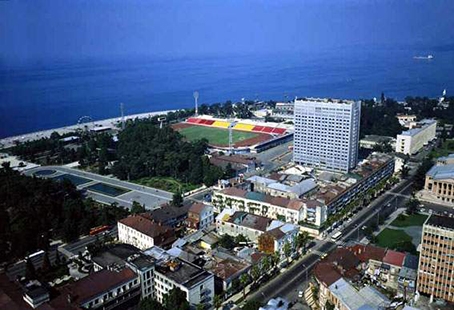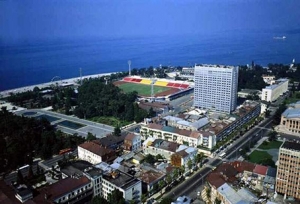Batumi – City of Sporting Revival?
The headline attraction of Georgia’s Black Sea coast, Batumi, has undergone a rapid transformation in the last 10 years with towering hotels and opinion-splitting sculptures lining its once under-stated promenade.
and opinion-splitting sculptures lining its once under-stated promenade.
However, amid the construction and tourism boom, the city’s main rugby and football clubs found themselves playing ‘home’ matches outside Batumi as the Tsentral Stadium became a victim of the seaside makeover in the mid-2000s.
For a city with a proud sporting heritage, this seemed a potentially devastating side-effect of Georgia’s aesthetic development under Mikheil Saakashvili’s presidency, but sports infrastructure has returned to the agenda in recent times following the change of government in 2012.
With the city attempting to cradle old and new, few are better qualified to talk about Batumi’s sporting past, present and future than Irakli Chavleishvili, the Deputy Chairman of the Batumi Municipality City Council, now in his third year in the position.
A native of the city, Chavleishvili’s father Guri was captain of Dinamo Batumi football club for 13 years in the 1950s and 1960s and went on to manage the club with great distinction for a further 15 years.
Navigating my way through Batumi’s palm-tree laden streets, mercifully quiet compared to Tbilisi, I find the City Hall where he gives me a customarily warm Adjaran welcome to his office.
Breaking the ice by complimenting the striking appearance of modern day Batumi, I ask Chavleishvili what he makes of his hometown in its current guise.
“Batumi was always very popular but sadly some of Old Batumi’s cultural heritage is gone with all these skyscrapers,” he says, echoing the thoughts of many of the city’s natives.
Knowing his family connection to Dinamo Batumi, this prompts me to ponder his opinion of the club’s ongoing homelessness and whether a new home was any closer to being sorted for the city’s rugby and football clubs.
“The stadium situation has been difficult for the club (Dinamo) but last season they finished high in the top league, despite these difficult conditions,” notes Chavleishvili, who then briefly mourns their defeat to Cypriot team Omonia Nicosia the previous night before revealing the latest developments with the long-awaited new stadium.
“There was a tender for the contract to build the new football stadium, which would be a 30,000-seater international standard facility. A Spanish company won the bid but now there are problems with documentation,” adds the Deputy Chairman, and since our meeting on July 10 the stadium saga is no nearer to a resolution.
At grassroots level though, there has been some progress with a new yard football tournament catering for a round 500 of the city’s youngsters, an initiative of which Chavleishvili has high hopes.
If there is a cautious optimism about the Deputy Chairman when it comes to football, he speaks in nothing but glowing terms when asked about rugby.
“We, Georgia, are achieving great progress in rugby and we should aim as high as possible in this sport. The efforts of Bidzina Ivanishvili (former PM) and the Georgian Rugby Union have been excellent in this direction,” notes Chavleishvili who then explains that two new stadiums, one for rugby and one for beach rugby, are under construction in the city.
Hitherto unaware of this development, when Chavleishvili offers to take me on a tour of the site, I postpone my Adjaruli khachapuri lunch and off we go.
Driving past the revamped coastline, we reach the new site of Batumi’s new rugby home around a kilometer inland to the south of the city.
As Chavleishvili points out correctly, construction is well underway with the main body of the tribune already erected and little more than seats to insert and a playing surface to be cultivated.
Its capacity, around the 2500 mark, may be modest compared to the grandiose visions of the forever delayed football stadium but will comfortably accommodate the city’s rugby club which finished 3rd in last season’s Georgian Premier Division.
Beach rugby is also growing in popularity in Batumi with an annual tournament attracting teams from all across Georgia and beyond.
Back in the bowels of Batumi City Hall, Chavleishvili educates me about the origins of rugby in Georgia.
“The Georgian people have had a long tradition in rugby. First we have the old game Lelo (similar to rugby in that one team, or indeed town, tries to carry a ball to the other end of the field with the other team, or town, permitted to use barely limited physical force to thwart their opponents. As possession of the ball is given up, the attackers become the attacked, and so on) which still takes places every year not far from Batumi,” he says, before adding that actual rugby was imported to these shores.
“The British forces used to come to Batumi or Poti in the 19th century and they played rugby with the locals, this is where actual rugby in Georgia was born,” notes Chavleishvili.
That brief but enlightening history lesson concludes a pleasant encounter with a man clearly devoted to both his city and his sport.
Batumi rugby club should play their first match in their new stadium by the end of the year and, while the fate of football in the coastal city is less certain, sport is no longer being forgotten in this peculiar corner of Georgia.
Alastair Watt












